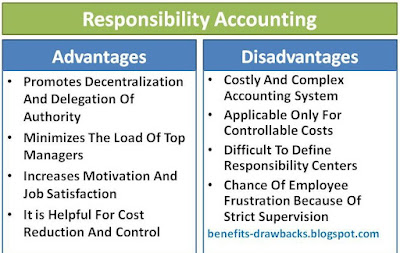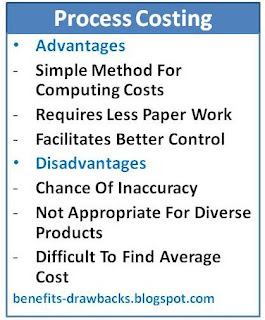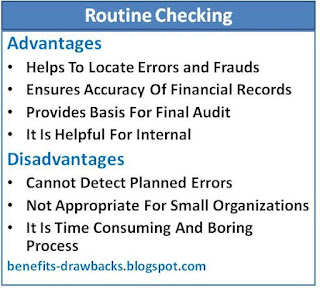What Is Responsibility Accounting ?
Responsibility accounting means identifying different responsibility centers (branch, department, units etc.) in the organization and measuring their inputs and output in order to understand their performance. It is an internal accounting system that compares actual performance of different responsibility centers with budget. It helps the company to achieve the accounting objectives.
Benefits Or Advantages Of Responsibility Accounting
The major advantages of responsibility can be highlighted as follows:
1. It Promotes Decentralization
In responsibility accounting, whole organization is divided into different units such as production department, marketing department, maintenance department etc. and responsibility is assigned to departmental managers. So, it encourages decentralization and delegation of responsibility which helps to manage organizational tasks efficiently.
2. It Reduces The Burden Of Top Manager
This system assigns the responsibility and duties to the managers of different departments, units, or responsibility centers. So, it reduces the workload of top managers and they can use their time and effort to make future plans and policies.
3. Fair Performance Evaluation
It evaluates the performance or achievement of departments or units with the help of pre-established standards. It helps to measure the efficiency of each manager and employee of different responsibility centers.
4. It Increases Motivation
Lower level managers know that they are under supervision and their achievement will be compared with pre-planned goals. So, it create awareness and motivates them to perform better to obtain good results.
5. Better Decision Making
Responsibility accounting provides data and information about the performance and outcomes of each department to the top level management. It helps the managers to make important decision regarding future planning and actions.
6. Corrective Action
It provides performance report of each responsibility center to the management as quickly as possible. It helps to take appropriate steps and corrective actions to improve operating activities in the organization.
7. Helpful For Cost Control
Responsibility centers are encouraged to perform activities within the limits of budget. It helps to minimize unnecessary costs in the workplace.
8. Suitable For Big Organizations
It is suitable for big business organizations with various departments, segments, units etc. because they cannot be monitored, controlled and managed by a single management.
Drawbacks Or Disadvantages Of Responsibility Accounting
The major disadvantages of responsibility accounting can be pointed out as follows:
1. It Is A Costly System Of Accounting
As we know that this system promotes decentralization, it requires skilled and competent line managers to manage departments properly. So, it requires more cost to hire capable managers and personnel.
2. Possibility Of Employee Frustration
Because of strict supervision and control, employees may feel frustrated and stressed. Frustration and depression adversely affect their performance which may reduce productivity and profitability.
3. Only For Controllable Costs
Responsibility accounting is applicable to measure and control controllable costs only. It does not work with uncontrollable costs.
4. May Lack Accuracy
Results obtained from responsibility accounting may lack accuracy if there is no quick and effective reporting system in the organization. Delayed report makes top management difficult to measure the performance and take appropriate steps in case of any mistake.
5. It Is A Complex System
It is very difficult to establish organizational chart and to assign authority and responsibility properly to the right person. It is hard task to set goals or objectives for each center. So, it is a complex method of accounting.
6. Not Suitable For Small Organizations
Responsibility accounting is complex and costly system. So, it is not suitable for small business organizations with less operational activities and fewer resources.
Pros:
- It is helpful for performance evaluation of each department.
- It helps the management to make future plans and to make sound decisions
- It helps to minimize unnecessary expenses
- It is suitable for big companies
- Because of decentralization, it minimizes the load of top management
- It improves the morale of the departmental heads because they can develop managerial skills
Cons:
- It is costly as well as complex system, so responsibility accounting is not applicable for small companies having limited resources
- Subordinates may be frustrated because of strict supervision and control . So, there is a possibility of conflict between individual goals and organizational goals.
- It only works for controllable costs
- It is difficult to define responsibility centers














